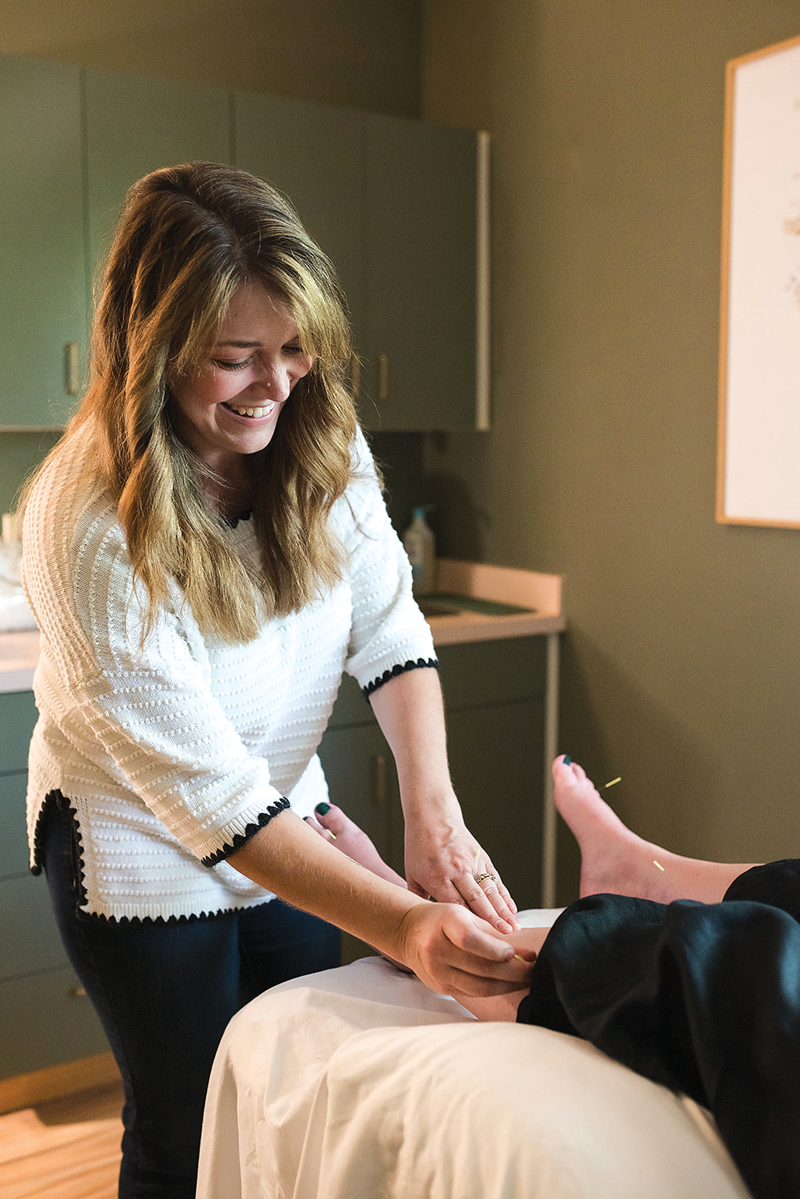Hot flashes, night sweats, brain fog, weight gain, mood changes, aches and pains, dry sex, thinner skin and smaller breasts: The symptoms of menopause sound like a nightmare. Changes in hormone production are the culprit for a litany of physical and mental health issues women typically begin experiencing in their mid-40s to early 50s. So begins a chapter that can be difficult for women to navigate, and while times are slowly changing, women’s health specialists say a taboo on the topic prevents plenty of healthy conversations from happening. But women who bring up menopause with their doctor are at an advantage, says Danika Forgach, a physician at the UCHealth Women’s Care Clinic in Timnath.
The process begins with perimenopause, which is when women start to see changes in their cycle length and flow and the beginnings of bothersome symptoms such as hot flashes, Forgach says. There is no point in time that perimenopause transitions to menopause; rather, once a woman has not had her period for a full year, she is considered to have been through menopause and is postmenopausal. Forgach says many women hear the terms “perimenopause” and “menopause” used interchangeably for that reason. On average, it takes between two and 10 years to hit a full year of having no period.
If it sounds confusing, you’re not alone, and that’s a main reason why it can be helpful to chat with a doctor. Forgach says it can also help to have conversations about some of the more radical and unexpected changes ahead.
For instance, many women aren’t aware that once their cycle changes, a stronger blood flow often follows, and the amount of blood can be alarming. Forgach cites one study that found that up to 14 percent of hospitalizations of women between the ages of 45 and 54 were for “massively abnormal uterine bleeding.”
While a heavy period is normal, getting in to the doctor when that happens is a good idea, Forgach says. Menopause strikes the same age range of women who are at risk of endometrial cancer, which also has symptoms that present as abnormal bleeding, she says. A standard workup can check for signs of cancer, and a doctor can help patients manage the bleeding with other treatments.
Undergoing hormone replacement therapy before reaching full menopause can help to ward off symptoms such as collagen and hair loss, and it can help to prevent heart problems and issues with osteoporosis, Forgach says. For women who want to stay away from hormones, she says a conversation about them is still worth having. She and other women’s health specialists say conversations about each symptom during this time in a woman’s life can have a major impact.
“There’s options,” Forgach says. “You do not have to suffer in silence.”

A panel at an annual women’s health and wellness event, evrē, speaking about menopause. Photo courtesy of UCHealth.
Hormone replacement therapy
For many women, the biggest question to answer ahead of menopause is whether hormone replacement therapy is the right fit.
Hormone replacement therapy, or HRT, is a treatment that supplements the primary hormones women are no longer producing naturally. For those who have had a hysterectomy, the only hormone needed is estrogen, Forgach says. For all others, both estrogen and progesterone make up HRT.
The inclusion of testosterone is a more recent and controversial addition to some HRT treatments, Forgach says. Studies point to its ability to improve sexual function, but in reality, she says it only amounts to about one additional sexually satisfying event per month. She also notes that testosterone can worsen cholesterol and impair liver function.
Leading up to menopause, the ovaries work harder to produce estrogen, Forgach says, and they periodically stop to take a break, which causes fluctuations in estrogen. HRT stops those fluctuations, which can cut hot flashes by 75 percent and reduce hair thinning, collagen loss and bone loss (during the first five to 10 years of menopause symptoms, Forgach says women lose anywhere from two-to-five percent of their bone density per year). HRT has also been shown to decrease the risk of Alzheimer’s, Forgach says, and estrogen-only HRT can even decrease the risk of cardiovascular disease since estrogen is somewhat protective against it.
Despite the benefits, some women are reluctant to go on HRT. A 1993 study of HRT gave the treatment a bad rap due to findings that showed an increased risk of breast cancer, cardiovascular disease and stroke, Forgach says, and yet the results are antiquated for a few reasons. For example, the study included women who were in their 60s and 70s when they started HRT. Now, 30 years later, doctors typically won’t recommend HRT to women if they are more than five years removed from the onset of menopause or if they are over 65, Forgach says.
When looking at the results only for women who started HRT in their 50s, the data doesn’t look nearly as bad. Forgach says there is still a slight increase in risk while using HRT, but the chances are small.
“People feel like they should avoid hormones, but there’s very little harm to them,” Forgach says.
Still, she says women who aren’t comfortable with HRT have plenty of options. She has a long list of nonhormonal medications that have been proven to help with hot flashes and night sweats, two of the most common and disruptive symptoms of menopause. Her favorite is Veozah, a relatively new medication developed specifically for those symptoms. Others include Brisdelle, Clonidine and Oxybutynin.
There is also medication just for the vagina, Forgach says. For those bothered only by vaginal dryness and pain during sex, estrogen in the form of cream, pills or a ring can help. Women can also ask their doctor about nonhormonal solutions, she says.

Meghan Peckinpaugh, owner of Balanced Thistle. Photo by One Oak Photography.
The holistic factor
Meghan Peckinpaugh sees women all the time who are on HRT but complain that they still don’t feel like themselves. While the treatment can ease symptoms for many women, the level of hormones they receive still isn’t as high as what they were likely producing naturally, says Peckinpaugh, founder of Balanced Thistle, a holistic wellness center in Fort Collins.
That’s where natural solutions, such as acupuncture, medicinal herbs, nutrition and functional medicine can help, she says.
Acupuncture and traditional Chinese medicine excel at treating hot flashes, night sweats and brain fog, Peckinpaugh says. She estimates that those treatments are successful with her patients about 90 percent of the time.
Acupuncture seeks to restore balance by focusing on points on the body that have a cooling effect, she says, and Chinese herbal medicine is an ancient practice that catalogues herbs that have a similar cooling effect.
“It’s incredibly simple, and beautiful in its simplicity,” she says.
Acupuncture also excels at helping the body reach a parasympathetic state, which allows the body’s involuntary functions to take over. The practice takes the edge off of the nervous system, allowing bodily functions like hormone regulation to run without anxiety-induced interruptions and recognize where things aren’t functioning optimally, Peckinpaugh says.
“We, as modern American women, often live in this sympathetic fight-or-flight, over-stimulated part of our nervous system,” she says.
For symptoms like weight gain or concern of cardiovascular disease, Peckinpaugh says nutrition and functional medicine come into play. Estrogen helps to regulate the body’s insulin, so irregularities in the hormone often lead to the less healthy weight gain that shows up in the center of the abdomen, she says.
The right diet with adequate levels of fiber, protein and nutrients can help to support blood sugar regulation and reduce those issues, Peckinpaugh says. Timing meals in accordance with personal schedules, like when a woman wakes up or works out, can also help.
It’s important to remember that simply going to get acupuncture or getting on HRT won’t solve every problem, Peckinpaugh says. Achieving wellness takes work and commitment.
“Taking care of yourself is an everyday decision,” she says. “Menopause is normal, and it’s a bumpy ride. What we try to do is reduce the severity of those bumps to make the transition as smooth and as comfortable as possible.”
________________________________________________________________________________________________________
An End in Sight?
In the U.S., the average age of women who have reached post-menopause, or who just completed a full year without a period, is 51, Forgach says. While the symptoms of menopause should theoretically end, she says some women in their 80s continue to report disruptive hot flashes and other symptoms. The reality is that women should be prepared to spend about a third of their lives in this new chapter of lower sex hormone production, she says.
Women who use HRT have historically been advised to end it after about five years, Forgach says. But new evidence is emerging that suggests they can continue the treatment for much longer as long as they return yearly for exams, as prolonged use of HRT does heighten the risk of things like breast cancer, heart disease and blood clots.
Some of Forgach’s patients have continued to take HRT in their 70s and 80s, though they understand the risks and agree to return to the doctor every year. If and when a woman opts to end HRT, she must do so knowing that about 50 percent of women experience a renewed onset of menopause symptoms, Forgach says.
________________________________________________________________________________________________________
Mental Health Challenges
Changing hormone levels during menopause often cause mental health issues such as mood swings and an increase in stress and anxiety, Peckinpaugh says. The psycho-social element of menopause can also add to the stressors, she says, as women going through this stage might feel that it is a signal they are growing old and obsolete.
Both Peckinpaugh and mental health experts say that treatments like hormone replacement therapy, nutrition and lifestyle factors (such as exercise) are proven ways to improve mental health symptoms. Physician groups with UCLA Health, Stanford University and others say that cognitive behavioral therapy and support groups are also effective treatment options.
Having a strong support network is an essential element of self-care that grows even more important during this time. While antidepressants typically aren’t a first-line treatment, women can also talk with their doctor about whether mental health medication is the right fit.







